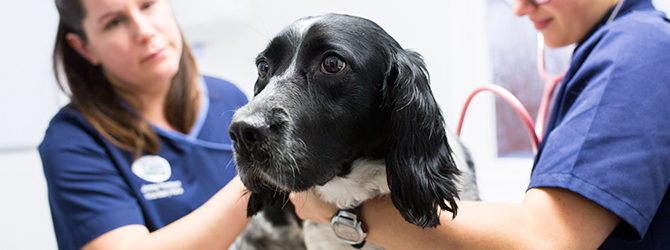Anaemia in dogs: causes, symptoms and treatment
Just like in us humans, dogs can become anaemic when the body doesn’t produce enough red blood cells or haemoglobin – or when they suffer severe blood loss as a result of an injury, accident, or a condition such as cancer or stomach ulcers.
Often the symptom of another disease, anaemia in dogs can sometimes point to a fatal condition and should always be taken seriously.
So, what causes anaemia in dogs, and how do you spot the signs?
Haemo what now?!
Haemoglobin – pronounced he-mu-glow-bin – and red blood cells help to transport oxygen around the body from the lungs and to remove carbon dioxide from the body. Red blood cells (also known as erythrocytes) are produced in the bone marrow and circulate for around three months before the body breaks them down and replaces them.
When the body doesn’t produce enough haemoglobin or red blood cells, your dog may become weak and lethargic, and can experience the symptoms listed below.
Always take your dog to the vet if he displays any of these symptoms. As dogs with anaemia don’t always show signs of the condition, regular veterinary check-ups are vital.
Symptoms of anaemia in dogs
The signs and symptoms of anaemia in dogs include:
- Pale gums
- Pale eyes or ears
- Black stools
- Fast pulse
- Rapid breathing
- Vomiting
- Weakness or lethargy
- Loss of appetite
- Weight loss
- Swelling in the face or jaw
Common causes of anaemia in dogs
Anaemia can be the result of disease, hormone or bone marrow abnormalities, poor nutrition, or toxicity. Some of the more common causes of canine anaemia include:
- Severe blood loss as a result of accident or injury
- Tick-borne diseases such as Lyme disease
- Autoimmune diseases
- Hypothyroidism
- Toxins or poisons
- Blood loss cause by parasitic infection
- Cushing’s disease
- Infectious diseases such as canine distemper
- Cancer
Diagnosing and treating anaemia in dogs
Your vet will often recommend blood tests to establish your dog’s red blood cell count, any parasites present in the body, and the function of his liver and pancreas, as well as urinalysis to check for any urinary tract infections (UTIs).
Treatment for anaemia depends on the type and the cause. Your vet will recommend a suitable treatment depending on the cause of the anaemia and the type.
Treatment or management of canine anaemia may include:
- Intravenous fluid
- Antibiotics in the case of bacterial infection
- Blood transfusion in the case of severe blood loss
- Bone marrow transfusion
- Gastrointestinal medicine
- Medication to remove parasites
Can I prevent my dog from getting anaemia?
Believe it or not, infection spread by fleas and ticks is one of the most common causes of anaemia in dogs – so that’s one more reason to keep up regular treatments against pests and parasites. You can also help by keeping your dog away from human medications, and avoiding exposure to toxic substances and human foods, such as onions.
“Treatment for anaemia depends on the type and the cause. Your vet will recommend a suitable treatment depending on the cause of the anaemia and the type.”
Need advice on canine anaemia?
For expert advice on anaemia in dogs get in touch with your local vet.
Find your nearest vet using our Find a Vet page, or speak to a vet online using Online Vets.

